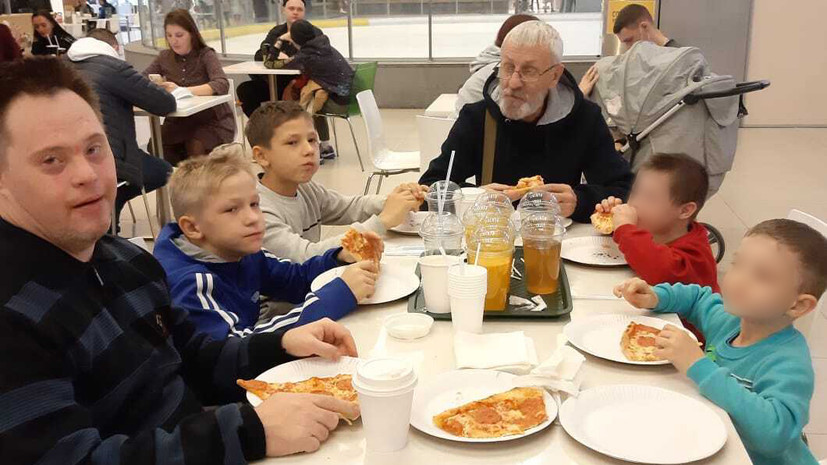Seven-year-old Ivan (not his real name - RT), who was under the care of spouses from Surgut Svetlana V. and Sergey F, was given to his biological father, with whom the guardians have been suing since the fall of 2022.
As RT wrote earlier, the boy's mother and father left him in the Stavropol maternity hospital in 2016, signing an adoption permit. When Vanya was four years old, he had to go from the orphanage to a boarding school for children with disabilities. Svetlana and Sergey took the boy under guardianship, and, according to them, were going to adopt, but due to the outbreak of the coronavirus pandemic, the process was suspended.
In 2022, it turned out that Ivan's father had been paying alimony to the orphanage for two years, and not to his son's new family, and the guardians filed a lawsuit. In turn, the boy's father challenged the claim, revoked his permission for adoption and expressed a desire to raise his son on his own.
In March 2023, the Surgut City Court ruled that Ivan remained living with Svetlana and her husband, and also deprived the boy's biological mother of parental rights. Vanya's mother and father also had to pay alimony until their son came of age.
- © Photos from the personal archive
However, on May 26, the guardians received a call from the guardianship and asked to come to review the documents. There, Sergei F. was informed that Ivan should be immediately handed over to his own father.
"That day I was on the train, returning home," Svetlana told RT. - My husband did not sign anything, took the children (the family, in addition to Ivan, takes care of four more minors, and brings up the eldest son, also with Down syndrome - RT), and went to meet me. He did not answer the calls of the guardianship, and he received an SMS that the car was wanted. At the station, the police and guardianship representatives were waiting for them, who took Vanya away in front of their brothers and sisters.
According to Ivan's guardians, the boy was taken to a local hospital, where "he was alone in a ward with bars on the windows." Svetlana insists that the hasty removal of the child, who needs constant accompaniment, turned out to be a great stress for him: "I came to the hospital to give Vanya fruit, cookies, some of the things. The staff told me that he didn't sleep well, didn't eat well, and screamed."
Other children under the care of Svetlana and Sergey are also very worried, having lost their brother, she continues: "They are scared, they sit in the room, they are afraid to walk. They ask me: "Mom, will they take us away too?"
The boy's guardians wrote statements to the Ministry of Internal Affairs, the Investigative Committee, the prosecutor's office, appealed to the authorities of the city and the Khanty-Mansi Autonomous Okrug, the regional commissioner for children's rights, as well as to the court. On Sunday, May 28, Ivan was handed over to his biological father, Svetlana adds: "As far as I know, Vanya will live in a two-room apartment with his father, his new wife, their common small child and two more children from his wife's first marriage. That is, the conditions are cramped, not suitable for a boy with a disability. In addition, Vanin's dad did not do it almost from birth.
As Svetlana said, Ivan's father saw him "a few times" from the beginning of the trial. "Vanya did not react to his dad in any way - after all, he is, in fact, a stranger to him," she recalls those meetings.
- © Photos from the personal archive
At the same time, according to Lyudmila Nizamova, Commissioner for Children's Rights in the Khanty-Mansi Autonomous Okrug, Ivan's meetings with his father were productive: "As far as I know, the boy recognized his father, went to his arms, held his face, that is, he did not feel any hostility towards his parent."
As the children's ombudsman explained to RT, the guardianship acted within the law. "The court found no grounds for depriving the father of parental rights," she said. - In this situation, biological parents have a priority, upbringing by their own father, of course, in the interests of the child. The decision on the status of the child is made by the guardianship authority, the court does not regulate, terminate or replace the guardianship in any way. You can appeal against their actions, you can apply to the prosecutor's office, but the decision itself was made legally.
The Commissioner for Children's Rights in the Khanty-Mansi Autonomous Okrug noted that as soon as the father revoked his permission for adoption and sent a statement that he plans to raise the boy himself, the guardianship authority had to stop paid guardianship and take measures to transfer the child: "Then it would be possible to establish a certain transition period so that the transfer of the boy did not take place in such a short time. As for the forced participation of police officers in the transfer of the child, this measure had to be resorted to when it turned out that there was no one at home, and the guardians did not answer calls.
Lyudmila Nizamova added that the conditions in which Vanya will now live "have been carefully studied by the regional guardianship authorities," both in the Khanty-Mansi Autonomous Okrug and in the Stavropol Territory, and the family "will be monitored in the future."

